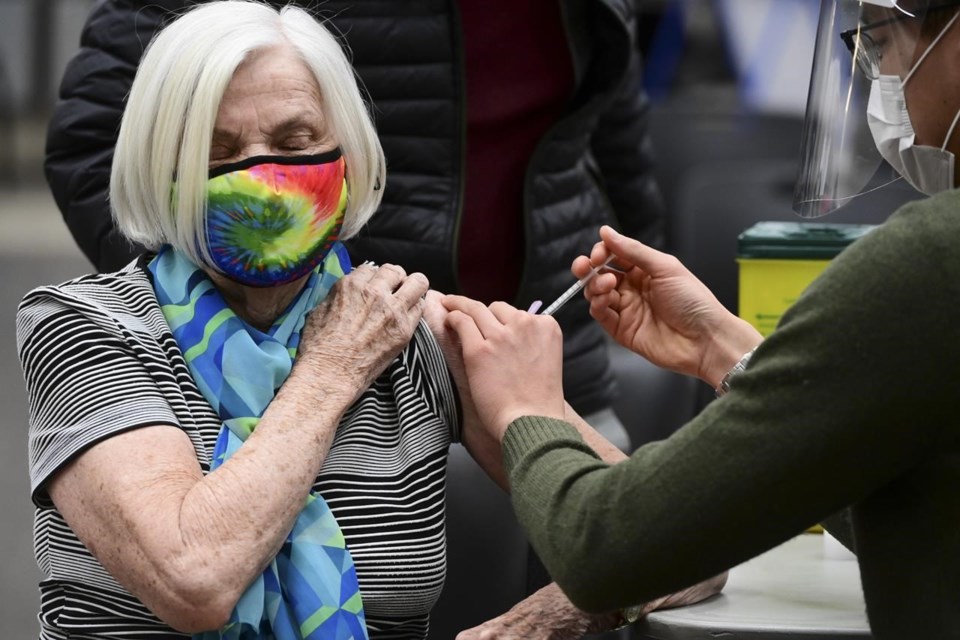OTTAWA — Health Canada approved a new COVID-19 vaccine from Moderna Thursday that targets both the original strain of the novel coronavirus and the specific Omicron variant.
The new shots approved by Health Canada, called bivalent vaccines, are designed to recognize specific mutations in the spike protein of the Omicron BA.1 subvariant.
Shipments of the vaccine are expected to arrive in the next few days, and there will be enough supply for all Canadians 18 and older to get a dose this fall and winter, officials said.
"With the Omicron variant now circulating, we know that the existing vaccines can be less effective," said Dr. Supriya Sharma, Health Canada's chief medical adviser, during an online news conference on Thursday.
In a decision posted on Health Canada's website, the regulator says data show the new vaccine induces a similar immune response to the original strain of the COVID-19 virus and significantly higher responses to the Omicron BA. 1 variant, when compared with the earlier version of the Moderna vaccine.
The United Kingdom approved Moderna's new vaccine two weeks ago, and the United States Food and Drug Administration gave Moderna and Pfizer-BioNTech's Omicron-fighting shots the green light earlier this week.
The version approved in the U.S. targets newer and more prevalent strains of the Omicron variant than the one submitted for approval in Canada.
"While the vaccine was designed to more specifically target the Omicron BA.1 subvariant, we know that this vaccine also generates a good immune response against Omicron BA.4 and BA.5 subvariants that have more recently emerged," Sharma said.
The Omicron variant arrived in Canada in late 2021 and has spread aggressively ever since. Subvariants of Omicron are now by far the most common strains of the virus.
The BA.5 subvariant currently represents approximately 82 per cent of the virus circulating in Canada, Public Health Agency of Canada data show. BA.4 makes up nearly 12 per cent and BA.1 represents only 0.1 per cent.
Health Canada has specifically asked Moderna and Pfizer-BioNTech to request approval for vaccines that target the BA.4 and BA.5 subvariants, and is expecting applications from both companies within the next few weeks.
The National Advisory Committee on Immunization recommends that people over the age of 18 should be offered the Omicron booster.
If the newer shot isn't available, the committee says people should instead opt for a booster shot of the original COVID-19 vaccine to ensure timely protection.
NACI generally recommends that people wait six months after their last vaccine or a COVID-19 infection before getting another shot.
NACI also says the Omicron shot should be considered for children aged 12 to 17 who are immunocompromised, though the vaccine is not approved for use in kids and the expert recommendation makes clear that the relative risks and benefits remain uncertain.
Canada has already purchased 12 million doses of Moderna's version of the Omicron vaccine,which includes converting some existing orders for the original Moderna vaccine so that the newly adapted version will be delivered instead.
Health Minister Jean-Yves Duclos said deliveries are expected to begin to arrive before the end of this week, and some provinces will start administering doses as early as next week.
Some provinces, including Ontario and Saskatchewan, have reacted to the news saying that initial supplies are expected to be limited, so to start, they expect to offer Omicron doses to people who are most at risk.
British Columbia expects most people who qualify for the new vaccine in the province should be able to get one in September of October.
Dr. Howard Njoo, the deputy chief public health officer, said at a press conference that based on provincial and territorial projections, "there will be enough supply of the Moderna Spikevax bivalent COVID-19 vaccine in Canada for everyone 18 years of age and older this fall and winter."
The public health agency has urged Canadians to get whatever booster shot they can if it has been more than six months since their last shot.
"The simple message is having up to date vaccination is the key priority to restore protection," chief public health officer Dr. Theresa Tam said. "The booster that is available to you is better than not being up to date with your vaccine protection."
Duclos said the willingness of Canadians to get boosted will be a crucial part of fending off another potentially large wave of infections in the fall.
While more than 90 per cent of adults have received two doses of an approved COVID-19 vaccine in Canada, only about 59 per cent have opted for a booster dose as of Aug. 14, Public Health Agency of Canada data show.
Those numbers put Canada behind all other G7 nations except for the United States, Duclos said.
Duclos said if 90 per cent of adult Canadians get a booster this fall, the public health agency projects hospitalizations related to COVID-19 will drop by up to 90 per cent by winter.
He said the federal government will launch an awareness campaign next week in an effort to convince people to keep their vaccinations up to date.
This report by The Canadian Press was first published Sept. 1, 2022.
Laura Osman, The Canadian Press



